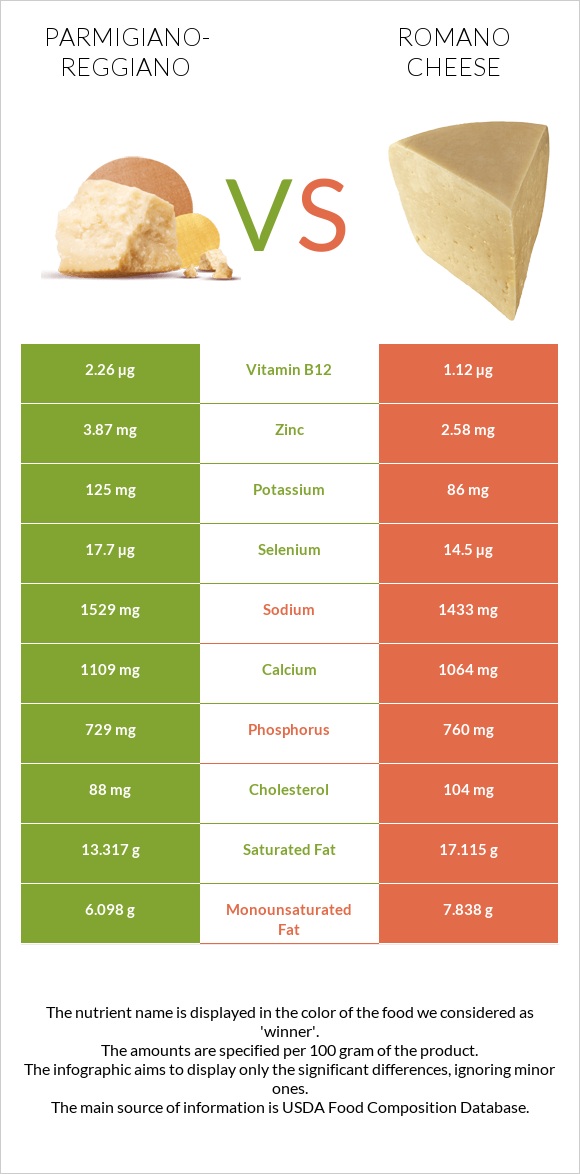Parmigiano-Reggiano vs. Romano cheese — In-Depth Nutrition Comparison
Compare
Important differences between parmigiano-Reggiano and romano cheese
- Romano cheese has less vitamin B12, copper, zinc, vitamin B2, and selenium.
- Parmigiano-Reggiano's daily need coverage for vitamin B12 is 48% more.
- Parmigiano-Reggiano has 8 times more copper than romano cheese. Parmigiano-Reggiano has 0.238mg of copper, while romano cheese has 0.03mg.
- Romano cheese is lower in sodium.
The food varieties used in the comparison are Cheese, parmesan, dry grated, reduced fat and Cheese, romano.
Infographic

Infographic link
Mineral Comparison
Mineral comparison score is based on the number of minerals by which one or the other food is richer. The "coverage" charts below show how much of the daily needs can be covered by 300 grams of the food.
| Contains more PotassiumPotassium | +45.3% |
| Contains more IronIron | +16.9% |
| Contains more CopperCopper | +693.3% |
| Contains more ZincZinc | +50% |
| Contains more ManganeseManganese | +325% |
| Contains more SeleniumSelenium | +22.1% |
Vitamin Comparison
Vitamin comparison score is based on the number of vitamins by which one or the other food is richer. The "coverage" charts below show how much of the daily needs can be covered by 300 grams of the food.
| Contains more Vitamin AVitamin A | +66.7% |
| Contains more Vitamin B2Vitamin B2 | +31.4% |
| Contains more Vitamin B3Vitamin B3 | +48.1% |
| Contains more Vitamin B12Vitamin B12 | +101.8% |
| Contains more FolateFolate | +42.9% |
| Contains more Vitamin EVitamin E | +35.3% |
| Contains more Vitamin DVitamin D | +25% |
| Contains more Vitamin B1Vitamin B1 | +27.6% |
| Contains more Vitamin B5Vitamin B5 | +30.5% |
| Contains more Vitamin B6Vitamin B6 | +73.5% |
| Contains more Vitamin KVitamin K | +29.4% |
All nutrients comparison - raw data values
| Nutrient |  |
 |
DV% diff. |
| Vitamin B12 | 2.26µg | 1.12µg | 48% |
| Protein | 20g | 31.8g | 24% |
| Copper | 0.238mg | 0.03mg | 23% |
| Saturated fat | 13.317g | 17.115g | 17% |
| Zinc | 3.87mg | 2.58mg | 12% |
| Fats | 20g | 26.94g | 11% |
| Vitamin B2 | 0.486mg | 0.37mg | 9% |
| Vitamin A | 160µg | 96µg | 7% |
| Calories | 265kcal | 387kcal | 6% |
| Selenium | 17.7µg | 14.5µg | 6% |
| Cholesterol | 88mg | 104mg | 5% |
| Calcium | 1109mg | 1064mg | 5% |
| Phosphorus | 729mg | 760mg | 4% |
| Sodium | 1529mg | 1433mg | 4% |
| Monounsaturated fat | 6.098g | 7.838g | 4% |
| Manganese | 0.085mg | 0.02mg | 3% |
| Vitamin B6 | 0.049mg | 0.085mg | 3% |
| Iron | 0.9mg | 0.77mg | 2% |
| Vitamin B5 | 0.325mg | 0.424mg | 2% |
| Carbs | 1.37g | 3.63g | 1% |
| Vitamin D | 15 IU | 20 IU | 1% |
| Magnesium | 38mg | 41mg | 1% |
| Potassium | 125mg | 86mg | 1% |
| Vitamin D | 0.4µg | 0.5µg | 1% |
| Vitamin B1 | 0.029mg | 0.037mg | 1% |
| Folate | 10µg | 7µg | 1% |
| Choline | 20.7mg | 15.4mg | 1% |
| Polyunsaturated fat | 0.462g | 0.593g | 1% |
| Net carbs | 1.37g | 3.63g | N/A |
| Sugar | 0g | 0.73g | N/A |
| Vitamin E | 0.17mg | 0.23mg | 0% |
| Vitamin B3 | 0.114mg | 0.077mg | 0% |
| Vitamin K | 1.7µg | 2.2µg | 0% |
| Tryptophan | 0.24mg | 0.429mg | 0% |
| Threonine | 1.519mg | 1.171mg | 0% |
| Isoleucine | 1.2mg | 1.685mg | 0% |
| Leucine | 2.983mg | 3.071mg | 0% |
| Lysine | 2.459mg | 2.941mg | 0% |
| Methionine | 0.369mg | 0.852mg | 0% |
| Phenylalanine | 1.604mg | 1.71mg | 0% |
| Valine | 1.498mg | 2.183mg | 0% |
| Histidine | 0.752mg | 1.231mg | 0% |
Macronutrient Comparison
Macronutrient breakdown side-by-side comparison
Protein:
20 g
Fats:
20 g
Carbs:
1.37 g
Water:
50.6 g
Other:
8.03 g
Protein:
31.8 g
Fats:
26.94 g
Carbs:
3.63 g
Water:
30.91 g
Other:
6.72 g
| Contains more WaterWater | +63.7% |
| Contains more OtherOther | +19.5% |
| Contains more ProteinProtein | +59% |
| Contains more FatsFats | +34.7% |
| Contains more CarbsCarbs | +165% |
Fat Type Comparison
Fat type breakdown side-by-side comparison
Saturated fat:
Sat. Fat
13.317 g
Monounsaturated fat:
Mono. Fat
6.098 g
Polyunsaturated fat:
Poly. Fat
0.462 g
Saturated fat:
Sat. Fat
17.115 g
Monounsaturated fat:
Mono. Fat
7.838 g
Polyunsaturated fat:
Poly. Fat
0.593 g
| Contains less Sat. FatSaturated fat | -22.2% |
| Contains more Mono. FatMonounsaturated fat | +28.5% |
| Contains more Poly. FatPolyunsaturated fat | +28.4% |




